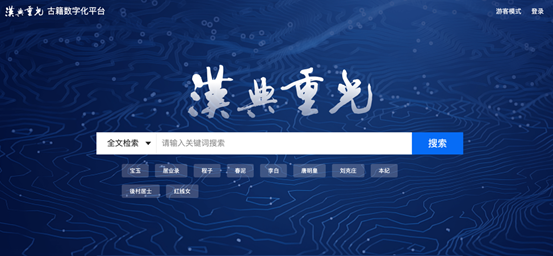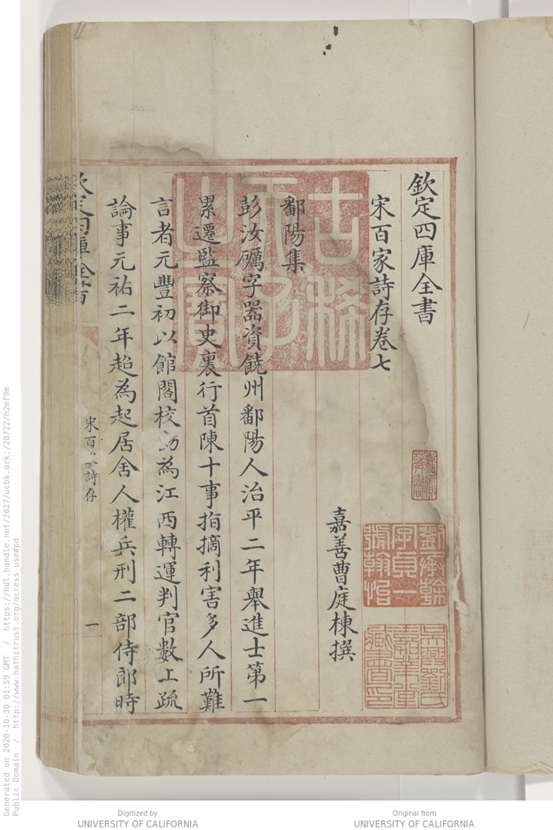Classic Chinese texts are an enormous reservoir of knowledge. The wood and bamboo carvings, books, manuscripts, and printed copies from the Song, Yuan, Ming and Qing Dynasties, maps, and texts of ethnic minorities crystalize the rich experiences of ancient Chinese in coping with natural disasters, pandemics, economic challenges, political fights, diplomatic crisis, climatic changes and wars and record their lifestyle by showing how they maintained health and treated diseases, how traditional Chinese medicine was used, and what furniture, attire, and food were popular.
Hundreds of years ago, some of these texts where shipped abroad as diplomatic gifts or taken away during trade and wars. Many were damaged and lost during the turbulence in modern times. An incomplete count shows over four million copies of 400,000 texts were in the custody of foreigners.
It may be difficult to retrieve the texts; but they can return in a digital form.
In 2019, Alibaba and Sichuan University proposed the idea of a digital return of classic texts. Dr. Wang Guo, Deputy Director of the School of History and Culture of Sichuan University, and Dr. Chen Li, CCICH Fellow, secured the support of University of California, Berkeley after engaging a number of libraries in North America, Europe, Japan and South Korea. They began to digitalize the copies of ancient Chinese texts in the East Asian Library of the university.
University of California, Berkeley has one of the top three East Asian libraries in the US. Forty percent of its total collection of 900,000 books are Chinese books, the third largest in the country, and quite a number of them are inscriptions on bones and rubbings of inscriptions.
A program named Handian Chongguang (revival of classic Chinese texts) were launched by the Alibaba Foundation, Sichuan University, University of California, Berkeley, the National Library of China and Zhejiang Library to locate, digitalize, and make available to the general public ancient Chinese texts abroad so that everyone can get to read them and appreciate how the ancient sages viewed the world and what ancient Chinese culture was like.
In order to produce texts from the scanned documents and catalogues provided by Berkeley, Alibaba DAMO Academy for Discovery, Adventure, Momentum and Outlook and Sichuan University jointly developed a new system for reading ancient texts, which reached an accuracy of 97.5% in converting the 200,000 pages. The system now can bulk read hundreds of books at the same time and includes in it dictionaries of over 30,000 words. It works nearly 30 times more efficient than human beings. And the more texts it handles, the more accurate and efficient it becomes.
The “Handian Chongguang” platform was officially launched in China Science and Technology Museum in Beijing on the 18 May 2021.
According to its team, as a first step, 200,000 pages of ancient texts have gone online for the general public to search and read. They include over 40 rare print copies and manuscripts from the Song, Yuan, Ming and Qing Dynasties, such as the Collection of Houcun and Jinsushan Collection of Buddhist Writings; manuscripts by famous scholars such as Qian Qianyi, Weng Fanggang, and Wang Tao; copies from famous private libraries such as Jiaye Tang and Miyunlou; and the incomplete copy of Siku Quanshu (Complete Library in the Four Branches of Literature) in Wenlange Library in the Qing Dynasty which were damaged during the war. Many are very rare pieces that had gone inaccessible for years.
It has been learned that the Alibaba DAMO Academy, Sichuan University, University of California, Berkely, the National Library of China and Zhejiang Library will continue to work on this program to bring more ancient texts back to life.
Mr. Zhang Jianfeng, President of the Alibaba DAMO Academy, said Alibaba would donate the technological tools and digital platform to a trusted public authority for long-term management so that it will be an open space for the general public.
Dr. Chen Li, who has spent much of his life working on ancient texts, believes these texts are not only records of the Chinese civilization, but also an asset of humanity. He encourages more players to join in the preservation and promotion of these texts so that everyone can be exposed to them and learn to use them. This will breathe new life into the texts and revive the words of wisdom they carry.

Handian Chongguang Digital Platform

Poems from the Song Dynasty, Wenyuange Edition (Vol.7)
